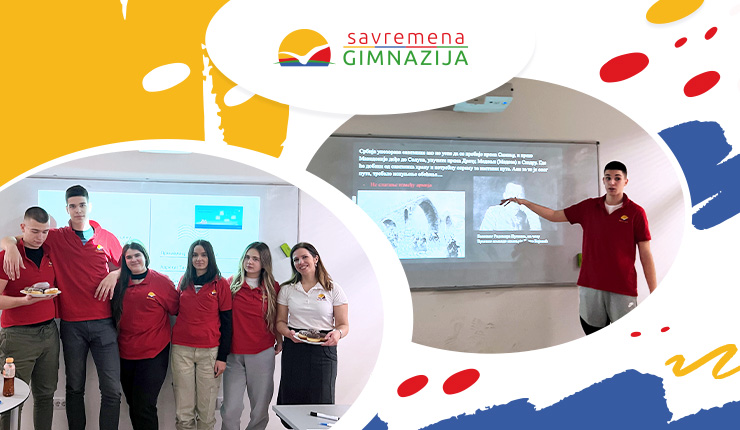
How are doughnuts, the Albanian Golgotha and the song "The Blue Tomb" connected? Starting from the fact that a sound basis for a well-addressed topic is good student motivation, Serbian language and literature professor Zorana Putniković brought doughnuts to the III-1 students in class, introducing them to the story by connecting a fragment from the novel "Sixth Day" by Rastko Petrović with the central theme of the song "The Blue Tomb" written by Milutin Bojić.
He dreamed of doughnuts. Hot doughnuts. Nothing else, just that. Not even the plate they're on. One long, big dream about hot doughnuts, their illuminated, yellow, radiant shape, surrounded by a halo, their smell, and the desire to taste them and feel them in his mouth.
He fell asleep without any idea of the time and place where he was. At first, he was losing consciousness. He lost consciousness several times during that day. It was in that state that he fell asleep. The night was cold and the cold finally woke him up at dawn. He was dreaming of hot doughnuts all the time though. (Rastko Petrović, Sixth Day)
After reading this fragment, they came to the conclusion together about how lucky and privileged we are as a generation and that it is necessary to know what and how many sacrifices our ancestors made in order for us today to have what we have and to be who we are.

Matej Petrović held a lecture on the cause of the First World War and the retreat through Albania, which earned an applause
The historical background of the causes of the First World War and the retreat through Albania was presented to us by our student Matej Petrović, and he covered all the important aspects of this historical period in an exceptional way, placing special emphasis on the heroism of the Serbian people. The other students listened attentively to his presentation and it was clear that this topic, handled in this way, is now much clearer to them. At the end of the lecture, Matej received a big, well-deserved round of applause and congratulations for the excellently handled topic.
Exceptional empathy and students' desire to learn even more about our past
During the 90-minute class, they also touched upon the heroes of the First World War: Milunka Savić, Momčilo Gavrić, Sofija Jovanović, Dragutin Gavrilović, as well as other people who marked this period (famous military leaders, King Petar I, Makrena Spasojević, the only civilian in the world whose monument was ordered to be built by the Serbian king Petar I Karadjordjević). Many others, unknown to history, but no less brave, were buried in the Blue Tomb, and Milutin Bojić's song of the same name pays tribute to all those who suffered and died in the Albanian Golgotha.
The reason why the professor decided to motivate the students to cover the song in this way is that she noticed with the students of this class that, when the story of the sufferings and patriotism of the Serbian people is brought up, they show exceptional empathy and a desire to learn even more about our past. As the teaching of Serbian language and literature is often connected with our history and has an important educational role, it is certain that it is important to shed light on the historical circumstances in which the Serbian people found themselves. This helps in achieving two goals: the students understand much better the context in which the literary work was created, and after such classes, they become more proud of being members of our nation.

















